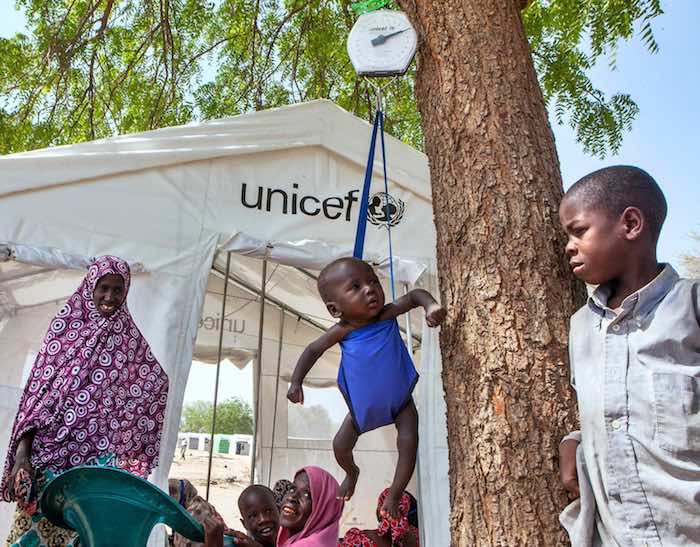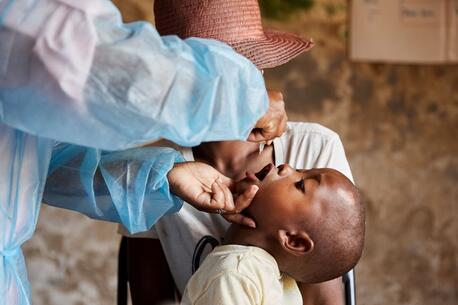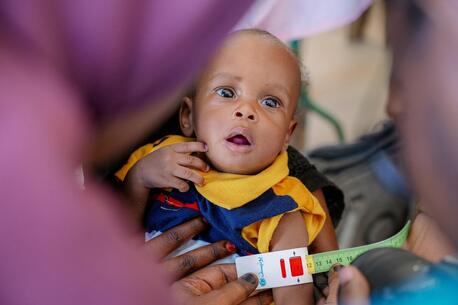
In Boko Haram's Wake, a Quarter Million Children Severely Malnourished
In areas that Boko Haram once controlled, thousands of Nigerian children face severe malnutrition, and many are at risk of death.
Update 8/3: Convoy Attacked in Northeast Nigeria, but Aid Deliveries Continue
On Thursday July 28, unknown assailants attacked a humanitarian convoy that included staff from UNICEF. The convoy was traveling to Maiduguri in Borno State, Nigeria, after delivering desperately needed humanitarian assistance. A UNICEF employee and an IOM contractor were injured in the attack.
Despite the attack, UNICEF is continuing to provide aid. UNICEF Nigeria representative Jean Gough said, “We continue to call for increased efforts to reach people in desperate need across the state. We cannot let this heartless attack divert any of us from reaching the more than two million people who are in dire need of immediate humanitarian assistance.”
A Brutal Insurgency; Lives in the Balance
Nearly a quarter of a million severely malnourished children cling precariously to life in northeastern Nigeria's Borno State.
The Boko Haram insurgency's toll on children continues to grow. Since 2014, violence has swelled the number of displaced people in northeastern Nigeria to nearly 2 million, the vast majority in Borno state and neighboring Yobe and Adamawa. Children account for 57 percent of the displaced — more than a quarter of them are under the age of five. In all, 14.8 million people are affected by the crisis. The violence and danger is so great that hundreds of thousands have been forced to flee to neighboring Chad, Cameroon, and Niger.

©UNICEF/2016
Too many can't farm or work or live normal lives. Children pay the cost. A staggering 244,000 children in Borno are suffering from severe acute malnutrition. An estimated 49,000 will die if they are not reached immediately with treatment. “Some 134 children on average will die every day from causes linked to acute malnutrition if the response is not scaled up quickly," says Manuel Fontaine, UNICEF Regional Director for Western and Central Africa.

Sling-scales to detect malnutrition have been set up in the Dalori camp for families displaced by the insurgency, in Maiduguri in Borno State. ©UNICEF/Esiebo
A Crisis of Immense Scale
UNICEF has called for increased aid to save these children's lives. Fontaine implores, "We need all partners and donors to step forward to prevent any more children from dying. No one can take on a crisis of this scale alone."
The severely malnourished children of northeastern Nigeria can be saved — if they are treated in time. UNICEF's go-to treatment for severe acute malnutrition, Ready-to-Use Therapeutic Food packets (RUTF packets), contain an energy-packed paste made from peanuts, oil, milk powder and vitamin and mineral supplements. The packets are inexpensive, shelf-stable and proven to save lives.
UNICEF's Work for Borno's Children
UNICEF is working to reach as many of the affected children as possible. With its partners, UNICEF is screening and treating children for malnutrition and improving access to water and sanitation. UNICEF is also working to provide medical care, immunization, education and psychological support to the children affected by violence.
Additionally, UNICEF has trained health workers and community volunteers, many of whom are among the displaced, to provide an integrated package of services to manage and prevent acute malnutrition.

Children eat a communal meal at an informal learning center in a UNICEF-supported safe space in the Dalori camp in Maiduguri, Borno State. ©UNICEF/Esiebo
But the need is great, and UNICEF needs more help if it is to give the children of northeastern Nigeria a fighting chance. As UNICEF gains access to new areas with vast humanitarian needs in the coming weeks, it expects the appeal to increase significantly.
The scale of the malnutrition crisis so far may only be the tip of the iceberg, Fontaine believes. "There are 2 million people we are still not able to reach in Borno state, which means that the true scope of this crisis has yet to be revealed to the world."
Read the report Beyond Chibok about the Boko Haram insurgency's toll on children.
Support UNICEF's work to save and protect Nigerian children.
HOW TO HELP
There are many ways to make a difference
War, famine, poverty, natural disasters — threats to the world's children keep coming. But UNICEF won't stop working to keep children healthy and safe.
UNICEF works in over 190 countries and territories — more places than any other children's organization. UNICEF has the world's largest humanitarian warehouse and, when disaster strikes, can get supplies almost anywhere within 72 hours. Constantly innovating, always advocating for a better world for children, UNICEF works to ensure that every child can grow up healthy, educated, protected and respected.
Would you like to help give all children the opportunity to reach their full potential? There are many ways to get involved.





